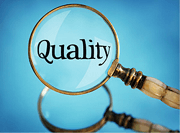Quality DefinitionQuality can be defined as the degree to which a product or service meets the expectations of the customer. This includes both tangible aspects, such as the product's physical characteristics and features, as well as intangible aspects, such as customer service and reliability. 
Quality: Definition, measurements and aboutQuality can be measured in a number of ways, including through customer satisfaction surveys, product testing, and industry standards. In manufacturing, quality control processes are put in place to ensure that products meet specific standards and requirements. This may include inspections, testing, and statistical analysis. Quality can also refer to the overall excellence of a product or service. This may include its design, functionality, durability, and performance. High-quality products are often associated with well-known, reputable brands and companies, and are often more expensive than lower-quality alternatives. In addition to physical products, quality can also be applied to services. For example, a high-quality service may be defined as one that is prompt, efficient, and provided by knowledgeable and friendly staff. Quality can also be used as a competitive advantage for companies. By offering high-quality products or services, a company can differentiate itself from its competitors and attract more customers. Additionally, a company that consistently produces high-quality products or services may be able to charge premium prices and increase its profitability. Quality managementQuality management is the process of planning, organizing, directing, and controlling the activities necessary to provide quality products and services. This includes establishing quality policies and objectives, setting quality standards, implementing quality control and quality assurance processes, and measuring and analyzing the results. Total Quantity ManagementTotal Quality Management (TQM) is a management approach that seeks to optimize the overall quality of a company's products and services through the involvement of all employees. TQM emphasizes continuous improvement, customer focus, and teamwork. ISO 9001 is an international standard that sets out the requirements for a quality management system. It is based on the principles of TQM and is used by organizations around the world to ensure that their products and services meet the needs of their customers. Improving qualityOne way to measure and improve quality is through the use of quality management systems, such as Total Quality Management (TQM) and ISO 9001. TQM is a management approach that aims to optimize the overall quality of a company's products and services by involving all employees in the process. This approach emphasizes continuous improvement, customer focus, and teamwork. ISO 9001, on the other hand, is an international standard that sets out the requirements for a quality management system. It is based on the principles of TQM and is widely used by organizations around the world to ensure that their products and services meet customer requirements and expectations. However, it is important to note that quality is not only limited to the product or service itself, but also encompasses the entire customer experience. This includes aspects such as customer service, delivery, and after-sales support. Companies that provide excellent customer service and support are often perceived as providing high-quality products and services, even if the product itself may have some defects. In addition, quality can also be improved through the use of advanced technologies such as Artificial Intelligence, Robotics, and IoT. These technologies can be used for quality control, process optimization, and predictive maintenance, which can help to improve the overall quality of products and services, as well as reduce costs. ConclusionIn conclusion, quality is a multifaceted concept that can be applied to both products and services. It is important for companies to understand what their customers expect and to consistently meet or exceed those expectations. Quality management and TQM approaches can help companies achieve this goal, as well as provide a competitive advantage and improve overall organizational performance. Quality is an essential aspect of any business and should be given the highest priority. Companies that prioritize quality are able to attract and retain customers, increase revenue, and improve overall organizational performance. Quality management systems, such as TQM and ISO 9001, and advanced technologies, can be used to achieve and maintain high-quality standards. Additionally, companies must also focus on providing an excellent customer experience to ensure overall customer satisfaction.
Next TopicRefraction Definition
|
 For Videos Join Our Youtube Channel: Join Now
For Videos Join Our Youtube Channel: Join Now
Feedback
- Send your Feedback to [email protected]
Help Others, Please Share









